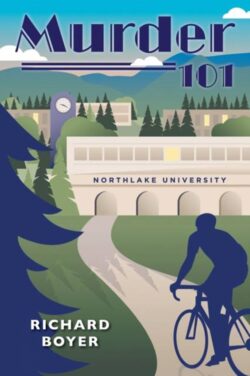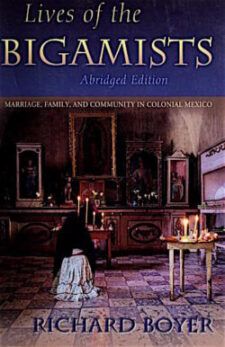1170 A master class in murder
Murder 101
by Richard Boyer
Victoria: FriesenPress, 2021
$16.99 / 9781525584527
Reviewed by Robin Fisher
*
 I have great admiration for those of my academic colleagues who, after a career of doing empirical work, then change gears and write successful fiction. The President to whom I reported at Mount Royal University, David Marshall, has in “retirement” written a series of rollicking novels that he calls “aeroplane reads” but are actually much better than that description suggests. In his first, called The Sand Trap, he has the director of international education at a Canadian university who moonlights as a hit man for the security service. He slips away from recruiting fairs in other countries to assassinate bothersome individuals. All in the national interest of course. For a split second I thought about the Director of International Education that Dave and I worked with but quickly realised, “nah, not possible,” it is all about the gift of a great imagination. A vivid imagination that I wished I had but know that I do not.
I have great admiration for those of my academic colleagues who, after a career of doing empirical work, then change gears and write successful fiction. The President to whom I reported at Mount Royal University, David Marshall, has in “retirement” written a series of rollicking novels that he calls “aeroplane reads” but are actually much better than that description suggests. In his first, called The Sand Trap, he has the director of international education at a Canadian university who moonlights as a hit man for the security service. He slips away from recruiting fairs in other countries to assassinate bothersome individuals. All in the national interest of course. For a split second I thought about the Director of International Education that Dave and I worked with but quickly realised, “nah, not possible,” it is all about the gift of a great imagination. A vivid imagination that I wished I had but know that I do not.

Now, Richard Boyer, my erstwhile colleague in the History Department at Simon Fraser University, has written a murder mystery appropriately titled Murder 101. Another active imagination has turned to fiction. As a historian, Richard Boyer wrote about people who lived in the shadows of law and transgression in the prize-winning book, Lives of the Bigamists: Marriage, Family, and Community in Colonial Mexico. That book required chasing down the evidence of otherwise hidden lives in the Inquisition records in Mexico. In Murder 101 his main character is a history professor who forsakes the final stages of a book project to follow the trail of evidence after a murder is committed. History and fiction: they have some similarities but more important differences. In our time, as the distinction between the two is often confused, Richard Boyer’s two books make it clear.
The scene of the crime in Murder 101 is Northlake University, a campus that has some likeness to SFU. Familiar names and locations show up from time to time and there is lots of detail about university life: classes to teach, students to supervise and the odd guest lecturer who is less than impressive. The detail of place and personality is an essential part of a good mystery. In Murder 101 the context and the characters are vividly realised based on the author’s thirty years of university experience. The body is discovered early on when the recently installed President is found dead in his office. The death is initially put down to misadventure but Bruce Monroe, the history professor-cum-detective, is not convinced. Monroe had been talking to the President only a couple hours earlier about a meeting to discuss future directions for the university and he seemed perfectly healthy. There are more nefarious, ego-driven ratbags in the administration at Northlake University than I ever encountered in university administration. Some of them try to sabotage Monroe’s investigation. University faculty commonly describe administrators as operating on the dark side and at Northlake that is certainly true of some of them. Needless to say, the faculty detective is not to be deterred by any mere administrator.

While I read many mysteries, I am not very good at spotting the clues and figuring out whodunit in advance. I usually just let the author make the revelation in their own good time. In Murder 101, I had a fair idea of the identity of the perp early on and so the question that remains is how will the case be assembled to prove it? Murder 101 is more in the British mode of mysteries than the American. There are murders and attempted murders, but there is not a lot a lot of gratuitous violence nor a high body count by the end of the story. The mystery is more procedural. Monroe is more like Adam Dalgliesh than Jack Reacher. He is an historian, so he pursues the evidence to its conclusion. He is also a faculty member so there is a fair chance that he will be following his own path: and he does. He is, for example, prone to gathering evidence in ways that will make it inadmissible in court, much to the annoyance of his police officer sidekick.
We are given insights into Monroe’s personal life. He rides his bike to work which certainly requires some imagination at Simon Fraser on top of Burnaby Mountain. He is a bit of a foodie and loves the outdoors. Unlike the main characters in much of recent British detective fiction, he is actually pretty normal. Lately, British authors like Robert Galbraith (aka J.K. Rowling) and Matthew Frank present lead characters who are damaged physically or psychologically, and preferably both. They consequently have complex personal lives. Even Peter Robinson’s solid and reliable Inspector Banks is several novels away from his ugly divorce, and has since been unsuccessful in love. Richard Boyer’s Monroe is single and has a couple of affairs, but the romantic relationships get a light touch. They do not distract him very much from his focus on proving who killed the President and why.
I must not, of course, give game away but let me just say that next time I am in the SFU (sorry, Northlake University) cafeteria I think that I will stay away from the muffins that I used to eat all the time.
So, if you like a fairly gentle mystery in the Agatha Christie or Ngaio Marsh tradition, but with a larger dash of violence thrown in, then read Richard Boyer’s Murder 101. It is well written, has a clear plot line, and strong, as in ego driven, characters. The case is closed by the end, but there are some minor sub-plot threads left hanging that perhaps suggest the possibility of a sequel or a series that will take us to another level in the curriculum: Murder 202 perhaps. I certainly hope so.
*

Robin Fisher taught and wrote history as a faculty member at Simon Fraser University before he moved into university administration and contributed to the establishment of two new universities: the University of Northern British Columbia in Prince George and Mount Royal University in Calgary. Lacking the imagination for fiction, he stuck to writing history. His books include Contact and Conflict: Indian-European Relations in British Columbia, 1774-1890 (UBC Press, 1977; second edition, 1992) and Duff Pattullo of British Columbia (University of Toronto Press, 1991). He has now written a biography, Wilson Duff: Coming Back — A Life that is forthcoming with Harbour Publishing. Editor’s note: Robin Fisher has reviewed books by William Frame & Laura Walker and Michael Layland for The Ormsby Review, and he has contributed a recent essay, “The Noise of Time” and the Removal of History?
*
The Ormsby Review. More Books. More Reviews. More Often.
Publisher and Editor: Richard Mackie
The Ormsby Review is a journal service for in-depth coverage of B.C. books and authors. The Advisory Board consists of Jean Barman, Wade Davis, Robin Fisher, Cole Harris, Hugh Johnston, Patricia Roy, Maria Tippett, and Graeme Wynn. Scholarly Patron: SFU Graduate Liberal Studies. Honorary Patron: Yosef Wosk. Provincial Government Patron since September 2018: Creative BC
“Only connect.” – E.M. Forster
4 comments on “1170 A master class in murder”